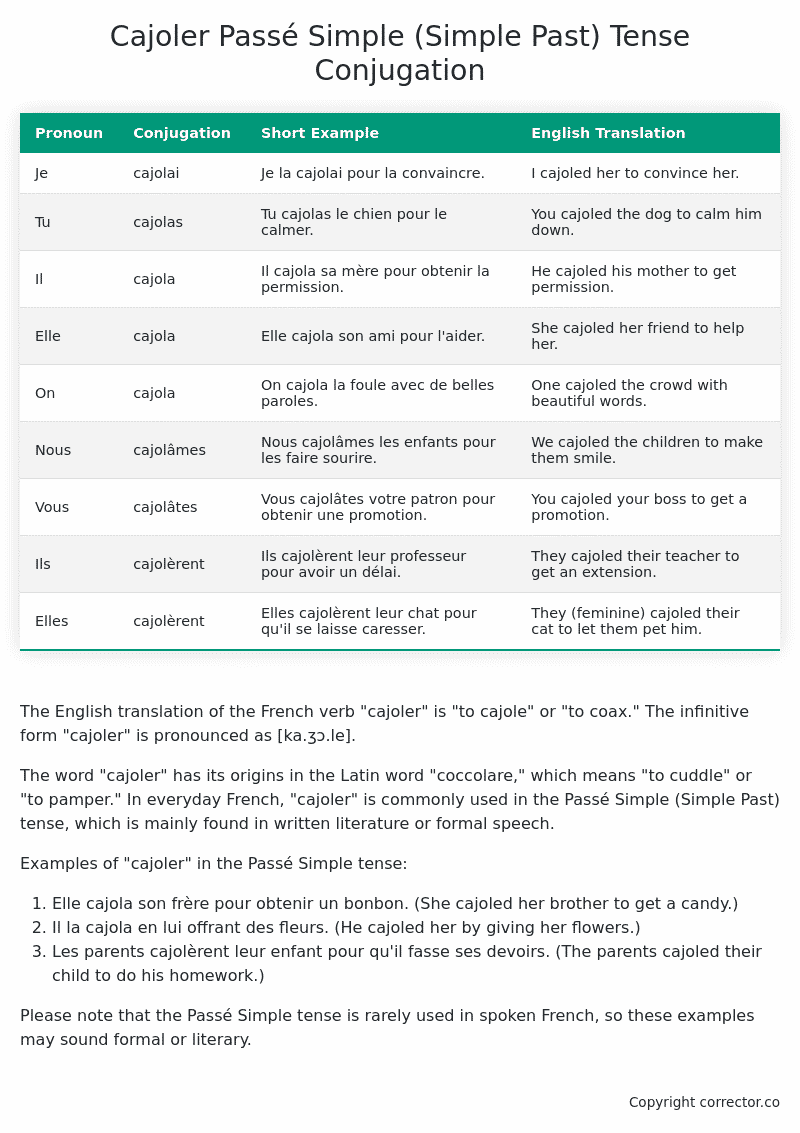Passé Simple (Simple Past) Tense Conjugation of the French Verb cajoler
Introduction to the verb cajoler
The English translation of the French verb “cajoler” is “to cajole” or “to coax.” The infinitive form “cajoler” is pronounced as [ka.ʒɔ.le].
The word “cajoler” has its origins in the Latin word “coccolare,” which means “to cuddle” or “to pamper.” In everyday French, “cajoler” is commonly used in the Passé Simple (Simple Past) tense, which is mainly found in written literature or formal speech.
Examples of “cajoler” in the Passé Simple tense:
- Elle cajola son frère pour obtenir un bonbon. (She cajoled her brother to get a candy.)
- Il la cajola en lui offrant des fleurs. (He cajoled her by giving her flowers.)
- Les parents cajolèrent leur enfant pour qu’il fasse ses devoirs. (The parents cajoled their child to do his homework.)
Please note that the Passé Simple tense is rarely used in spoken French, so these examples may sound formal or literary.
Table of the Passé Simple (Simple Past) Tense Conjugation of cajoler
| Pronoun | Conjugation | Short Example | English Translation |
|---|---|---|---|
| Je | cajolai | Je la cajolai pour la convaincre. | I cajoled her to convince her. |
| Tu | cajolas | Tu cajolas le chien pour le calmer. | You cajoled the dog to calm him down. |
| Il | cajola | Il cajola sa mère pour obtenir la permission. | He cajoled his mother to get permission. |
| Elle | cajola | Elle cajola son ami pour l’aider. | She cajoled her friend to help her. |
| On | cajola | On cajola la foule avec de belles paroles. | One cajoled the crowd with beautiful words. |
| Nous | cajolâmes | Nous cajolâmes les enfants pour les faire sourire. | We cajoled the children to make them smile. |
| Vous | cajolâtes | Vous cajolâtes votre patron pour obtenir une promotion. | You cajoled your boss to get a promotion. |
| Ils | cajolèrent | Ils cajolèrent leur professeur pour avoir un délai. | They cajoled their teacher to get an extension. |
| Elles | cajolèrent | Elles cajolèrent leur chat pour qu’il se laisse caresser. | They (feminine) cajoled their cat to let them pet him. |
Other Conjugations for Cajoler.
Le Present (Present Tense) Conjugation of the French Verb cajoler
Imparfait (Imperfect) Tense Conjugation of the French Verb cajoler
Passé Simple (Simple Past) Tense Conjugation of the French Verb cajoler (You’re reading it right now!)
Passé Composé (Present Perfect) Tense Conjugation of the French Verb cajoler
Futur Simple (Simple Future) Tense Conjugation of the French Verb cajoler
Futur Proche (Near Future) Tense Conjugation of the French Verb cajoler
Plus-que-parfait (Pluperfect) Tense Conjugation of the French Verb cajoler
Passé Antérieur (Past Anterior) Tense Conjugation of the French Verb cajoler
Futur Antérieur (Future Anterior) Tense Conjugation of the French Verb cajoler
Subjonctif Présent (Subjunctive Present) Tense Conjugation of the French Verb cajoler
Subjonctif Passé (Subjunctive Past) Tense Conjugation of the French Verb cajoler
Subjonctif Imparfait (Subjunctive Imperfect) Tense Conjugation of the French Verb cajoler
Subjonctif Plus-que-parfait (Subjunctive Pluperfect) Tense Conjugation of the French Verb cajoler
Conditionnel Présent (Conditional Present) Tense Conjugation of the French Verb cajoler
Conditionnel Passé (Conditional Past) Tense Conjugation of the French Verb cajoler
Conditionnel Passé II (Conditional Past II) Tense Conjugation of the French Verb cajoler
L’impératif Présent (Imperative Present) Tense Conjugation of the French Verb cajoler
L’impératif Passé (Imperative Past) Tense Conjugation of the French Verb cajoler
L’infinitif Présent (Infinitive Present) Tense Conjugation of the French Verb cajoler
L’infinitif Passé (Infinitive Past) Tense Conjugation of the French Verb cajoler
Le Participe Présent (Present Participle) Tense Conjugation of the French Verb cajoler
Le Participe Passé (Past Participle) Tense Conjugation of the French Verb cajoler
Struggling with French verbs or the language in general? Why not use our free French Grammar Checker – no registration required!
Get a FREE Download Study Sheet of this Conjugation 🔥
Simply right click the image below, click “save image” and get your free reference for the cajoler Passé Simple tense conjugation!

Cajoler – About the French Passé Simple (Simple Past) Tense
Formation
Usage
Narration
Historical Context
Interactions with other tenses
Passé Composé
Imparfait
Conditional and Subjunctive
Summary
I hope you enjoyed this article on the verb cajoler. Still in a learning mood? Check out another TOTALLY random French verb conjugation!


